(完整版)初中常见易混淆英语词汇
易与中文意思混淆的英语词汇

confidence man 骗子(不是“信得过的人”)
criminal lawyer 刑事n 加油站(不是“服务站”)
rest room 厕所(不是“休息室”)
dressing room 化妆室(不是“试衣室”或“更衣室”)
black stranger 完全陌生的人(不是“陌生的黑人”)
white coal (作动力来源用的)水(不是“白煤”)
white man 忠实可靠的人(不是“皮肤白的人”)
yellow book 黄皮书(法国政府报告书,以黄纸为封)(不是“黄色书籍”)
red tape 官僚习气(不是“红色带子”)
eleventh hour 最后时刻(不是“十一点”)
blind date (由第三者安排的)男女初次会面(并非“盲目约会”或“瞎约会”)
dead president 美钞(上印有总统头像)(并非“死了的总统”)
personal remark 人身攻击(不是“个人评论”)
sweet water 淡水(不是“糖水”或“甜水”)
He was only too pleased to let them go. 他很乐意让他们走。(不是“他太高兴了,不愿让他们走”)
It can't be less interesting. 它无聊极了。(不是“它不可能没有趣”)
1、日常用语类
lover 情人(不是“爱人”)
busboy 餐馆勤杂工(不是“公汽售票员”)
busybody 爱管闲事的人(不是“大忙人”)
dry goods (美)纺织品;(英)谷物(不是“干货”)
heartman 换心人(不是“有心人”)
mad doctor 精神病科医生(不是“发疯的医生”)
中考英语最易混淆词汇汇总

中考英语最易混淆词汇汇总1. clothes, cloth, clothingclothes统指各种衣服,谓语动词永远是复数, cloth指布,为不可数名词clothing 服装的总称,指一件衣服用a piece of, an article of2. incident, accidentincident指小事件, accident指不幸的事故He was killed in the accident.3. amount, numberamount后接不可数名词, number后接可数名词 a number of students4. family, house, homehome 家,包括住处和家人,house房子,住宅,family家庭成员. My family is a happy one.5. sound, voice, noisesound自然界各种各样的声音,voice人的嗓音,noise噪音I hate the loud noise sutside.6. photo, picture, drawingphoto用照相机拍摄的照片,picture可指相片,图片,电影片,drawing画的画Let's go and see a goodpicture.7. vocabulary, wordvocabulary词汇,一个人拥有的单词量,word具体的单词He has a large vocabulary.8. population, peoplepopulation人口,人数,people具体的人 China has a large population.9. weather, climateweather一天内具体的天气状况,climate长期的气候状况The climate here is not good for you.10. road, street, path, wayroad具体的公路,马路,street街道,path小路,小径, way道路,途径take this road; in the street, show me the way to the museum.11. course, subjectcourse课程(可包括多门科目),subject科目(具体的学科)a summer course12. custom, habitcustom传统风俗,习俗,也可指生活习惯,后接to do, habit生活习惯,习惯成自然,后接of doing. I've got the habit ofdrinking a lot.13. cause, reasoncause 指造成某一事实或现象的直接原因,后接ofsth./doing sth,reason用来解释某种现象或结果的理由,后接for sth./doing sth. the reason for being late14. exercise, exercises, practiceexercise运动,锻炼(不可数),exercises练习(可数), practice(反复做的)练习 Practice makesperfect.15. class, lesson作"课"解时,两者可以替换.指课文用lesson. 指班级或全体学生用class. lesson 6; class 516. speech, talk, lecturespeech指在公共场所所做的经过准备的较正式的演说,talk日常生活中的一般的谈话,讲话,lecture学术性的演讲, 讲课 a series of lecture on…17. officer, officialofficer部队的军官,official政府官员 an armyofficer18. work, job二者均指工作。
初中基础单词容易混淆的词汇
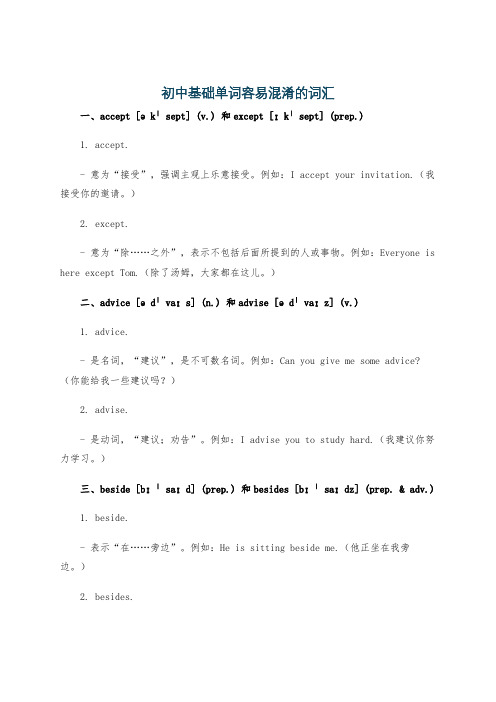
初中基础单词容易混淆的词汇一、accept [əkˈsept] (v.) 和except [ɪkˈsept] (prep.)1. accept.- 意为“接受”,强调主观上乐意接受。
例如:I accept your invitation.(我接受你的邀请。
)2. except.- 意为“除……之外”,表示不包括后面所提到的人或事物。
例如:Everyone is here except Tom.(除了汤姆,大家都在这儿。
)二、advice [ədˈvaɪs] (n.) 和advise [ədˈvaɪz] (v.)1. advice.- 是名词,“建议”,是不可数名词。
例如:Can you give me some advice?(你能给我一些建议吗?)2. advise.- 是动词,“建议;劝告”。
例如:I advise you to study hard.(我建议你努力学习。
)三、beside [bɪˈsaɪd] (prep.) 和besides [bɪˈsaɪdz] (prep. & adv.)1. beside.- 表示“在……旁边”。
例如:He is sitting beside me.(他正坐在我旁边。
)2. besides.- 作介词时,意为“除……之外(还有)”;作副词时,意为“而且;此外”。
例如:Besides English, we also learn French.(除了英语,我们还学法语。
);I don't like this dress. Besides, it's too expensive.(我不喜欢这条裙子。
而且,它太贵了。
)四、borrow [ˈbɒrəʊ] (v.) 和lend [lend] (v.)1. borrow.- 意为“借入”,常用搭配borrow sth. from sb.。
例如:I borrow a book from the library.(我从图书馆借了一本书。
(完整版)初中英语易混淆单词
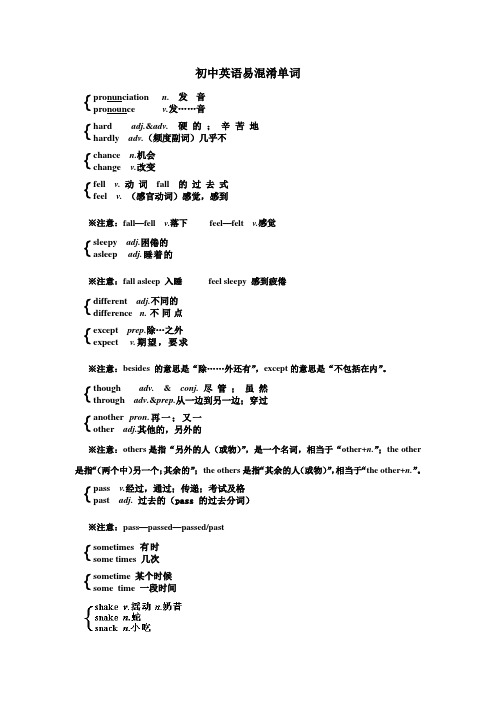
初中英语易混淆单词{pronunciation n.发音
pronounce v.发……音
{hard adj.&adv.硬的;辛苦地
hardly adv.(频度副词)几乎不
{chance n.机会
change v.改变
{fell v.动词fall的过去式
feel v. (感官动词)感觉,感到
※注意:fall—fell v.落下feel—felt v.感觉
{sleepy adj.困倦的
asleep adj.睡着的
※注意:fall asleep 入睡feel sleepy 感到疲倦
{different adj.不同的
difference n.不同点
{except prep.除…之外
expect v.期望,要求
※注意:besides 的意思是“除……外还有”,except的意思是“不包括在内”。
{though adv. & conj.尽管;虽然
through adv.&prep.从一边到另一边;穿过
{another pron.再一;又一
other adj.其他的,另外的
※注意:others是指“另外的人(或物)”,是一个名词,相当于“other+n.”;the other 是指“(两个中)另一个;其余的”;the others是指“其余的人(或物)”,相当于“the other+n.”。
{pass v.经过,通过;传递;考试及格
past adj. 过去的(pass的过去分词)
※注意:pass—passed—passed/past
{sometimes有时
some times几次
{sometime某个时候
some time一段时间。
初中英语易错单词总结

初中英语易错单词总结近期,我对我所教的初中学生的英语作业进行了分析,并总结出了一些他们易错的单词,这些错误可能是因为他们的拼写不熟练,也可能是因为他们对单词的意义理解不清楚。
以下是我总结的一些易错单词,并对每个单词进行了解释和示例用法,希望能对学生们提高英语水平有所帮助。
1. bicycle 自行车例句:I ride my bicycle to school every day.2. receive 收到例句:I received a letter from my friend.3. occasionally 偶尔例句:I occasionally go to the park on weekends.4. recommend 推荐例句:Can you recommend a good book to me?5. separate 分开例句:We need to separate the different types of recycling.6. believe 相信例句:I believe in myself and my abilities.7. definitely 肯定地例句:My favorite subject is definitely English.8. criticize 批评例句:The teacher criticized me for not doing my homework.9. convenient 方便的例句:The supermarket is convenient because it is close to my house.10. opportunity 机会例句:I am grateful for the opportunity to study abroad.11. disappointed 失望的例句:I was disappointed when I didn't get the job.12. decision 决定例句:It was a difficult decision to make, but I chose to study abroad.13. foreign 外国的例句:I love traveling and experiencing foreign cultures.14. recognize 认出例句:I couldn't recognize him because he changed his hairstyle.15. embarrass 尴尬例句:I felt embarrassed when I tripped and fell in front of everyone.16. occasion 场合例句:On special occasions, we celebrate with our families.17. competition 竞争例句:There is fierce competition for places at top universities.18. principal 校长例句:I went to the principal's office to discuss my grades.19. librarian 图书管理员例句:The librarian helped me find the book I was looking for.20. category 类别例句:The items in the store are organized into different categories.21. familiar 熟悉的例句:I am not familiar with this city because I just moved here.22. humorous 幽默的例句:The comedian told funny and humorous jokes.23. necessary 必要的例句:It is necessary to study hard for the exam.24. disappointed 失望的例句:I was disappointed when I didn't win the game.25. opportunity 机会例句:I had the opportunity to travel to France during summer vacation.26. independent 独立的例句:I want to be independent and live on my own.27. curiosity 好奇心例句:Children have a natural curiosity about the world around them.28. entrepreneur 创业者例句:He became a successful entrepreneur after starting his own business.29. disappointment 失望例句:The team's loss was a disappointment for their fans.30. environment 环境例句:It is important to protect the environment for future generations.这只是其中的一部分易错单词总结,学生们在学习英语时要多加练习,熟练掌握这些单词的拼写和意义,以便在英语学习中取得更好的成绩。
中考英语78个易混易错单词、短语、句型
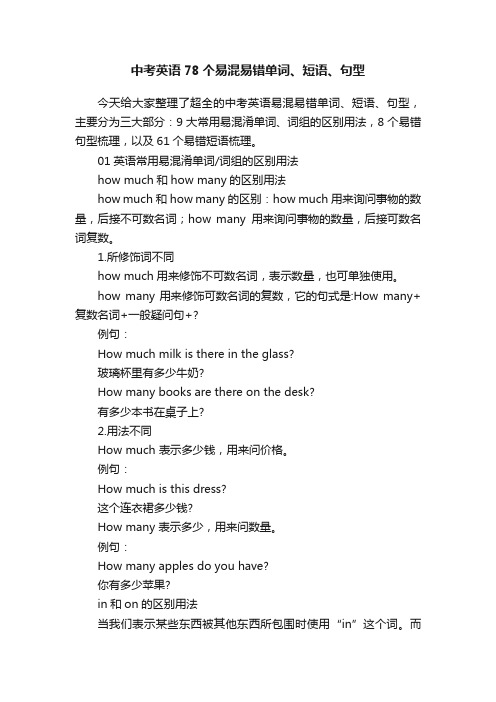
中考英语78个易混易错单词、短语、句型今天给大家整理了超全的中考英语易混易错单词、短语、句型,主要分为三大部分:9大常用易混淆单词、词组的区别用法,8个易错句型梳理,以及61个易错短语梳理。
01英语常用易混淆单词/词组的区别用法how much和how many的区别用法how much和how many的区别:how much用来询问事物的数量,后接不可数名词;how many用来询问事物的数量,后接可数名词复数。
1.所修饰词不同how much用来修饰不可数名词,表示数量,也可单独使用。
how many用来修饰可数名词的复数,它的句式是:How many+复数名词+一般疑问句+?例句:How much milk is there in the glass?玻璃杯里有多少牛奶?How many books are there on the desk?有多少本书在桌子上?2.用法不同How much 表示多少钱,用来问价格。
例句:How much is this dress?这个连衣裙多少钱?How many 表示多少,用来问数量。
例句:How many apples do you have?你有多少苹果?in和on的区别用法当我们表示某些东西被其他东西所包围时使用“in”这个词。
而“on”用于描述物体被放置在其他物体上方或外部的情况。
in可表时间,表地点,表手段、方法、材料。
on表示时间、地点、方位等。
1.意思不同in:prep.在 ... 里;在 ... 地方;在 ... 期间on:prep.在 ... 之上2.用法不同in:in着重一段时间的过程,常用于重复动作或延续动作。
in表示从现在时间算起推移到将来的一段时间之后,一般与将来时态连用。
例句:He is a layman in economics.他对经济学一窍不通。
on:表示“在物体的表面上”,只能用on的表达方式有on the next morning,on the following。
中考易混淆单词
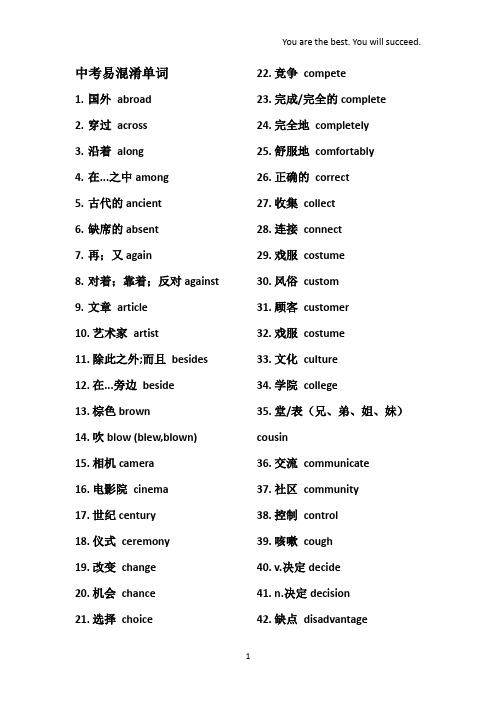
You are the best. You will succeed.中考易混淆单词1.国外abroad2.穿过across3.沿着along4.在...之中among5.古代的ancient6.缺席的absent7.再;又again8.对着;靠着;反对against9.文章article10.艺术家artist11.除此之外;而且besides12.在...旁边beside13.棕色brown14.吹blow (blew,blown)15.相机camera16.电影院cinema17.世纪century18.仪式ceremony19.改变change20.机会chance21.选择choice 22.竞争compete23.完成/完全的complete24.完全地completely25.舒服地comfortably26.正确的correct27.收集collect28.连接connect29.戏服costume30.风俗custom31.顾客customer32.戏服costume33.文化culture34.学院college35.堂/表(兄、弟、姐、妹)cousin36.交流communicate37.社区community38.控制control39.咳嗽cough40.v.决定decide41.n.决定decision42.缺点disadvantageYou are the best. You will succeed.43.挖dig(dug, dug)44.邀请invite45.发明invent46.邀请invitation47.发明invention48.分开divide49.电electricity50.电的electric51.电子的elcetronic52.实验experiment53.经验;经历experience54.尤其;特别especially55.确切地exactly56.极好的;优秀的excellent57.除了except58.期望expect59.表达express60.表现behave61.表扬perform62.渔夫fisherman63.第四fourth64.十四fourteen 65.第四十fortieth66.法语/法国人的French67.法国France68.外国人foreigner69.花园garden70.地理geography71.毕业graduate72.逐渐地gradually73.大体的general74.客人guest75.门卫;士兵guard76.导游guide77.德语/德国人的German78.德国Germany79.习惯habit80.爱好hobby81.幽默的humorous82.高度height83.重量weight84.加热heat85.心脏heart86.拥抱hug(hugged,hugged)87.隐藏hide(hid,hidden)88.放;下(蛋)lay( laid, laid)89.躺lie (lay, lain)90.撒谎(lied,lied)91.邀请invite92.发明invent93.产业;工业industry94.面试;采访interview95.介绍introduction96.指示;指令instruction97.立刻immediately98.日语/日本人的Japanese99.模型model100.中间的middle101.嘴巴mouth102.月month103.老鼠mouse104.钱money105.猴子monkey106.奖牌medal107.铁的metal108.精神上的mental 109.医学的medical110.药medicine111.机器machine112.材料material113.第九ninth114.九十ninety115.(两者)都不neither 116.(三者以上)都不none 117.第九十ninetieth 118.乘客passenger119.段落/走廊passage 120.合适地properly121.可能地possibly122.可能地probably123.承诺promise124.产品product125.英镑pound126.骄傲的proud127.骄傲n. pride128.小学生pupil129.紫色purple130.价格price131.奖品prize132.表扬;赞扬praise 133.星球planet134.种植/植物plant 135.荣幸;快乐pleasure 136.完美的perfect 137.耐心的patient 138.有礼貌的polite 139.飞行员pilot140.准备prepare 141.更喜欢prefer 142.预防prevent 143.保护protect144.污染pollute145.生产v. produce 146.过程n.process 147.十分quite148.安静的quiet 149.收到receive150.意识到realize 151.提醒remind152.复习,回顾review 153.害怕的(形容人)scared 154.害怕的(形容物)scary 155.酸的sour156.咸的salty157.糖sugar158.卖;销售n.sale159.卖;销售V.sell160.v.服务serve161.n.服务service162.n.仆人servant163.围巾scarf164.分离separate165.小吃,零食snack 166.蛇snake167.标准standard168.严格的strict169.严肃的,认真的serious 170.象征symbol171.标志sign172.社会society173.社会的social174.偷steal(stole, stolen)175.摇晃shake(shook,shaken) 176.传播spread177.速度speed178.猜想;设想suppose 179.支持support180.建议suggest181.成功v.succeed182.成功n.success183.通过through184.虽然though/although 185.扔throw (threw, thrown) 186.周二Tuesday187.周四Thursday188.十三thirteen189.三十thirty190.十二twelve191.第十二twelfth192.朝;向toward(s)=to 193.向前forward194.厕所toilet195.珍宝treasure196.雨伞umbrella 197.大学university 198.参观者visitor 199.视频;录像video 200.周三Wednesday 201.天气weather 202.是否whether。
(完整版)初中常见易混淆英语词汇

1.sound, voice, noisesound自然界各种各样的声音,voice人的嗓音,noise噪音I hate the loud noise outside.2. exercise, exercises, practiceexercise运动,锻炼(不可数),exercises练习(可数),practice(反复做的)练习take exercise 做运动3. work, job二者均指工作。
work不可数,job可数a good job,What interesting work it is!4. cook, cookercook厨师,cooker厨具He is a good cook.5. police, policemanpolice警察的总称,后接复数谓语动词,policeman 指某个具体的警察The police are questioning everyone in the house.6. problem, questionproblem常和困难联系,前面的动词常为think about, solve, raise,question常和疑问联系,多和ask, answer连用7. price, prizeprice价格,prize奖,奖品,奖金win the first prize The price is high/low.8. a number of, the number ofa number of许多,谓语动词用复数。
the number of…的数目,谓语动词用单数。
The number of students is increasing.9. in front of, in the front ofin front of范围外的前面,in the front of范围内的前面A boy sits in the front of the room.10. next year, the next yearnext year将来时间状语,the next year过去将来时间状语He said he would go abroad the next year.11. in bed, on the bedin bed卧在床上,on the bed在床上The book is on the bed. He is ill in bed.12. the people, a peoplethe people指人,a people指民族The Chinese is a peace-loving people.13. it, oneit同一物体,one同类不同一I lost my pen. I have to buy a new one.14. that, thisthat指代上文所提到的,this导出下文所要说的I was ill. That's why…15. none, nothing, no onenone强调有多少,nothing, no one强调有没有,nothing指物,no one指人--- How many…/How much…? --- None.16. anyone, any oneanyone指人,不能接of,any one指人/物均可,可接of, any one of you17. who, whatwho指姓名或关系,what指职业或地位What is your dad? He is a teacher.18. what, whichwhat的选择基础是无限制的,which在一定范围内进行选择Which do you prefer, bananas or apples?19. other, anotherother后接名词复数,another后接名词单数other students, another student20. many, much, a lot ofmany和可数名词连用,much和不可数名词连用,a lot of可数,不可数均可,但不用于否定句I haven't many books.21. much more…than, many more…thanmuch more…than后接形容词或不可数名词,many more…than后接可数名词many more people, much more water, much more beautiful22. no, notno=not a/any, no friend=not a/any friend, no water=not any water23. by oneself, for oneself, to oneselfby oneself单独的,独自的,for oneself为自己,to oneself供自己用的24. at all, after allat all根本,全然, after all到底,毕竟After all he is a child.25. tall, hightall常指人或动物,high常指物体He is tall.26. fast, quicklyfast侧重于指人或物体具有运动速度快的特点,quickly侧重指某事完成或发生的快run fast, answer the question quickly27. high, highlyhigh具体的高,highly抽象的高,高度的think highly of(高度赞扬)28. sleeping, asleep, sleepysleeping正在睡觉,asleep睡着,熟睡,只能做表语,sleepy困的,有睡意的a sleeping baby,The baby is asleep. I'm sleepy.29. real, truereal真的,真实的,指的是事实上存在而不是想象的,true真的,真正的,指的是事实和实际情况相符合real gold, a true story30. pleasant, pleased, pleasingpleasant常用作定语,pleased常用作表语,pleased主语常为人,a pleasant trip,be pleased with…对…感到满意/开心31. ill, sickill做表语,sick定语、表语均可a sick boy, He is sick/ill.32. good, wellgood形容词,well副词,但指身体状况是形容词He is well again.33. hard, hardlyhard努力,hardly几乎不work hard, I can hardly believe it.34. excited, excitingexcited使人兴奋的,exciting令人兴奋的I'm excited. The news is exciting.35. before long, long beforebefore long不久以后,long before很久以前36. happy, gladhappy高兴,幸福,定表均可,glad高兴,只能做表语a happy girl, I’m happy/ glad to see you.37. instead, instead ofinstead是副词,放在句首或句末,instead of是介词短语,放在句中He didn't see a film. Instead he watched TV. He watched TV instead of seeing a film.38. too much, much tootoo much 后接不可数名词,much too后接形容词much too heavy39. raise, riseraise及物动词,rise不及物动词The sun rises in the east. Raise your hand, please.40. bring, take, carry, fetchbring拿来,take带走,carry随身携带,fetch去回这一往返动作fetch a box of chalk41. spend, take, pay, costspend人做主语,花钱,花时间; s pend…on sth./(in) doing sth; take物做主语,花时间; It takes sb some time to do sth.; pay人做主语,花钱,pay for; cost物做主语,花钱;sth cost some money42. join, join in, take part injoin加入某个组织,并成为其中的一员;join in参加小型的活动, join sb. in;take part in 参加大型的活动He joined the army five years ago.43. learn, studylearn学习,侧重学习的结果,study学习,侧重学习的过程,研究study the problem44. want, hope, wishwant打算,想要,want to do, want sb. to do, hope希望(通常可以实现),hope to do/ hope that… wish希望(通常不能实现)wish (sb.) to do, wish sb/sth. + n. I wish you success.45. answer, replyanswer及物动词,reply不及物动词,后接to, reply to the letter46. leave, leave forleave离开,leave for前往He left Beijing for Shanghai.47. drop, falldrop及物\不及物均可,fall不及物动词Prices fell/dropped. He dropped his voice.48. win, lose, beatwin后接sth.,反义词为lose, beat后接sb. win the game, beat them49. live on, live bylive on以…为主食,live by靠…谋生live on fish/ live by fishing50. catch a cold, have a coldcatch a cold不能和表示"一段时间"的状语连用,而have a cold可以She has had a cold for a week.51. change for, change intochange for调换成,change into变成Change the shirt for a bigger one. Water changes into ice.52. go for a doctor, go to a doctorgo for a doctor去请医生,go to a doctor去看病53. arrive, get, reacharrive不及物动词,后接in (大地点),at(小地点),get不及物动词后接to,reach及物动词arrive in Beijing, get to Beijing, reach Beijing54. agree with, agree to,agree with同意某人,agree to同意某事,agree with you, agree to the plan, agree to do sth55. receive, acceptreceive收到某一东西,但不一定接受,accept接受I received a gift, but I didn't accept it.56. wear, put on, dresswear和dress表状态,wear接衣服等,可用进行时,dress接人,be dressed in, put on表动作It's cold outside. Put on your warm clothes.57. listen, hearlisten强调动作,hear强调结果I listened, but I heard nothing.58. look, see, watchlook看的动作,see看的结果,watch强调所看物体的变化、移动和发展watch TV59. lie, laylie躺,位于(lay, lain),说谎(lied, lied),lay平放(laid, laid) lay the book60. turn, get, growturn表突变,后常接表颜色的词,get强调变的结果,grow强调过程,逐渐的变化turn yellow, get tired, grow big61. close, shut, turn offclose和shut当关解时可以通用,用于可开合的物体,turn off用于指有开关的物体Close/Shut the door. Turn off the TV.62. at, in (表地点)at小地点,in大地点arrive at a small village, arrive in Shanghai63. day after day, day by dayday after day日复一日(无变化);day by day一天天地(有变化)Trees grow taller day by day.64. after, in (表时间)after接时间点,in接时间段,用于将来时after 7:00, in five minutes65. between, amongbetween两者之间,三者或三者以上两两之间, among三者或三者以上之间Switzerland lies between France, Germany, Australia and Italy.66. through, acrossthrough穿越空间,across在…上穿过through the forest, across the desert67. above, on, overabove在上面,不接触,on在上面,接触,over在正上方fly over the hill68. until, not…untiluntil到…为止,not…until直到…才(常跟点动词连用)I waited until 3:00.He didn't come until 3:00.69. besides, exceptbesides除了…还(包括在内)except除了(不包括在内),70. because, because ofbecause连词,连接两句话,because of后接词或短语He didn't go to school because of his illness.71. for example, such asfor example一般只列举一个,such as列举多个例子I have been to a lot of American cities, such as New York, Atlanta and Chicago.72. All right. That's all right. That's right.All right好吧;That's all right.没关系;That's right. 那是对的---Sorry. --- That's all right.73. such…that, so…that当如此…以至于解时,such…that修饰名词,so…that修饰形容词或副词,但名词前面如果有many, much, little, few修饰用so…that,不用such thatso many people that… such a lovely boy=so lovely a boy74. Shall I…? Will you…?Shall I…? 征求对方意见或向对方请示,意为我能…吗? Will you…?请求或建议对方做某事,意为你愿意…吗? Will you help me? Yes, I will.。
中考易拼错单词

中考易拼错单词
一、accommodation [əˌkɒməˈdeɪʃn],名词。
1. 含义:住宿;膳宿。
2. 易错点:容易少写一个“m”或者把“c”和“m”的顺序弄混。
二、embarrassed [ɪmˈbærəst],形容词。
1. 含义:感到尴尬的;难堪的。
2. 易错点:容易写成“embarrass”(动词)或者拼写时少字母,如写成“embarased”。
三、separate。
- 作动词 [ˈsepəreɪt]:分离;分开。
- 作形容词 [ˈseprət]:单独的;分开的。
1. 易错点:作动词时,容易忘记“a”后面的“r”;作形容词时,容易与动词形式混淆。
四、believe [bɪˈliːv],动词。
1. 含义:相信;认为。
2. 易错点:容易写成“beleive”,将“ie”顺序弄反。
五、receive [rɪˈsiːv],动词。
1. 含义:收到;接到。
2. 易错点:容易写成“recieve”,把“ei”顺序写错。
六、necessary [ˈnesəsəri],形容词。
1. 含义:必要的;必需的。
2. 易错点:容易写成“neccessary”,多写一个“c”。
七、government [ˈɡʌvənmənt],名词。
1. 含义:政府。
2. 易错点:容易写成“goverment”,少写一个“n”。
初中易混淆单词汇总

初中易混淆单词汇总摘要:1.初中生在学习英语过程中易混淆的单词2.为什么初中生会混淆这些单词3.解决混淆的方法和技巧正文:对于许多初中生来说,学习英语的过程中会遇到许多容易混淆的单词。
这些单词有些发音相似,有些拼写相近,有些意义相近,给学生们带来了很大的困扰。
首先,初中生在学习英语过程中易混淆的单词主要有以下几类:1.发音相似的单词,如:right 和write,boy 和buy,meet 和meat 等。
这些单词的发音相近,学生在听和说的过程中容易混淆。
2.拼写相近的单词,如:quite 和quiet,two 和too,knight 和night 等。
这些单词的拼写只有一、两个字母的差异,学生在写的过程中容易混淆。
3.意义相近的单词,如:happy 和glad,big 和large,long 和longer 等。
这些单词的意义相近,学生在理解和使用的过程中容易混淆。
那么,为什么初中生会混淆这些单词呢?这主要是因为初中生的英语词汇量有限,对英语的语音、语法、语义等方面的理解还不够深入。
同时,他们的思维方式和语言习惯也在一定程度上影响了他们对英语单词的理解和记忆。
针对这种情况,有什么解决方法呢?1.增加词汇量。
只有掌握了足够的词汇,才能在遇到相似的单词时进行有效的区分。
2.学习语音知识。
了解英语的发音规则,可以帮助学生正确发音,从而避免因发音相似而混淆单词。
3.建立单词卡片。
将易混淆的单词写在卡片上,经常进行比较和记忆,有助于区分和记忆这些单词。
4.多读多写。
通过大量的阅读和写作,可以提高学生的语感和语言运用能力,帮助他们更好地理解和使用英语单词。
总的来说,初中生在学习英语过程中遇到的混淆单词问题,需要通过增加词汇量、学习语音知识、建立单词卡片和多读多写等方式来解决。
八年级下册英语单词重点易错
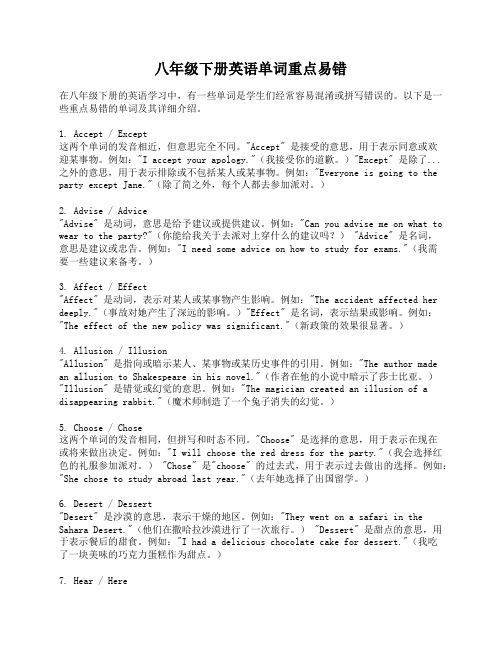
八年级下册英语单词重点易错在八年级下册的英语学习中,有一些单词是学生们经常容易混淆或拼写错误的。
以下是一些重点易错的单词及其详细介绍。
1. Accept / Except这两个单词的发音相近,但意思完全不同。
"Accept" 是接受的意思,用于表示同意或欢迎某事物。
例如:"I accept your apology."(我接受你的道歉。
)"Except" 是除了...之外的意思,用于表示排除或不包括某人或某事物。
例如:"Everyone is going to the party except Jane."(除了简之外,每个人都去参加派对。
)2. Advise / Advice"Advise" 是动词,意思是给予建议或提供建议。
例如:"Can you advise me on what to wear to the party?"(你能给我关于去派对上穿什么的建议吗?) "Advice" 是名词,意思是建议或忠告。
例如:"I need some advice on how to study for exams."(我需要一些建议来备考。
)3. Affect / Effect"Affect" 是动词,表示对某人或某事物产生影响。
例如:"The accident affected her deeply."(事故对她产生了深远的影响。
)"Effect" 是名词,表示结果或影响。
例如:"The effect of the new policy was significant."(新政策的效果很显著。
)4. Allusion / Illusion"Allusion" 是指向或暗示某人、某事物或某历史事件的引用。
英语中52组易混淆易用错词汇辨析

52组英语常见易混淆的词汇辨析1.border,boundaryborder,仅纸国界,边疆;boundary,任何的边界,界限例句:India often harasses China on the borders.There are some boundaries between us.2. spend, take, pay, cost,chargespend人做主语,花钱,花时间; spend…on sth./in doing sth; take 物做主语,花时间; pay人做主语,花钱,pay for; cost物做主语,花钱;charge 人做主语3.adjust,adaptadjust 调整,adapt 适应4.intervene,interfereIntervene 好的干预,起到积极作用;interfere 恶意干涉,打扰5. bring, take, carry, fetchbring拿来,take带走,carry随身携带,fetch去回这一往返动作fetch a box of chalk例句:Policemen are allowed to carry guns.6. sleeping, asleep, sleepysleeping正在睡觉,asleep睡着,熟睡,只能做表语,sleepy困的,有睡意的a sleeping baby The baby is asleep. I'm sleepy.7. used to, be used toused to过去常常,be used to习惯于,后接sth./doing sth.;被用来,后接do sth. He is used to getting up early.8. live on, live bylive on以…为主食,live by靠…谋生live on fish/ live by fishing9. leave, leave forleave离开,leave for前往He left Beijing for Shanghai.10. win, lose, beatwin后接sth.,反义词为lose, beat后接sb. win the game, beat them11. join, join in, take part injoin加入并成为其中的一员;join in参加小型的活动, join sb. in;take part in 参加大型的活动He joined the army five years ago.12. arrive, get, reacharrive不及物动词,后接in (大地点),at(小地点),get不及物动词后接to,reach及物动词arrive in Beijing, get to Beijing, reach Beijing13. lose, misslose失去(具体的物体),错过sth. is lost, lose the chance;miss 想念,错过sth. is missing, miss the chance14. be tired of, be tired with/frombe tired of厌烦…,be tired with/from因为…而累了be tired with/from running 800 meters15. feed, raisefeed喂养,养活,饲养(to give food to),raise饲养,养育(cause to grow, bring up children) raise the family16. care about, care forcare about关心,计较,在乎,一般多用于否定句中;care for关心,照料,喜欢,愿意例句:He doesn't care about his clothes.I don't care for movies.17. mean to do, mean doingmean to do打算,想要做某事,mean doing意思是,意味着By this I mean giving the students more practice.18. a girl, one girla girl可泛指所有女孩, one girl一个女孩Can one girl carry such a big box?19. in place of, in the place ofin place of代替,in the place of在…地方例句:A new building is built in the place of the old one.20. in secret, in the secretin secret秘密地,暗自地,偷偷地,一般用作状语;in the secret知道内情,知道秘密,一般用作表语My mother was in the secret from the beginning.21. take a chair, take the chairtake a chair相当于sit down坐下,take the chair开始开会21. die from, die ofdie from表示死于(枪)伤,虚弱,过度劳累,饮食过度等,die of 表示死于疾病,饥饿,寒冷,年老,忧愁,失恋等精神因素die of hunger and cold22. pay for, pay back, pay offpay for为…付钱,pay back还钱,但不一定还清,pay off还清pay for the book, pay off the debt23. manage, trymanage to do设法做成了某事,try to do尽力去做某事但不一定成功He tried to pass the exam, but he failed.24. be familiar to, be familiar withbe familiar to某物对某人来说是熟悉的,be familiar with某人熟悉某物The book is familiar to me. I'm familiar with the book.25. agree with, agree to, agree onagree with sb同意某人,agree to sth同意某事,agree on在…上达成一致意见,主语是复数agree with you, agree to the plan26. receive, acceptreceive收到某一东西,但不一定接受,accept接受I received a gift, but I didn't accept it.27. wear, put on, dresswear和dress表状态,wear接衣服等,可用进行时,dress接人,be dressed in, put on表动作It's cold outside. Put on your warm clothes.28. listen, hearlisten强调动作,hear强调结果I listened, but I heard nothing.29. look, see, watchlook看的动作,see看的结果,watch强调所看物体的变化、移动和发展watch TV30. lie, laylie躺,位于(lay, lain),说谎(lied, lied),lay平放(laid, laid) lay the book31. hurt, injure, woundhurt感情上受伤,injure事故中受伤,wound战争中受伤He was wounded in the war.32. turn, get, growturn表突变,后常接表颜色的词,get强调变的结果,grow强调过程,逐渐的变化turn yellow, get tired, grow big33. happen, take placehappen偶然性的没有预料到的事情的发生,take place必然性的发生Great changes have taken place in my hometown.34. at, in (表地点)at小地点,in大地点arrive at a small village, arrive in Shanghai 35. increase to, increase byincrease to增长到…,increase by增长了…The number increased by 2,000 to 5,000.36. besides, except, except forbesides除了…还(包括在内)except除了(不包括在内),except for 整体…除了某一点以外The composition is good except for a few spelling mistakes.37. on earth, on the earth, in the earthon earth在世上,在人间,到底,究竟,一点也不,on the earth在地上,在地球上,in the earth在地下,在泥土里no use on earth38. in surprise, to one's surprisein surprise惊奇地,to one's surprise使某人吃惊的是,39. in the air, on the air, in the skyin the air正在酝酿中,on the air播送,广播,in the sky在天空中His show is on the air at 6:00 tonight.40. since, for (完成时间状语)since接点时间或一句话,for接一段时间for three years, since 3:00 41. through, acrossthrough穿越空间,across在…上穿过through the forest, across the desert42. on the way, in the wayon the way在前往…的路上,in the way挡路The chair is in the way.43. above, on, overabove在上面,不接触,on在上面,接触,over在正上方fly over the hill44. until, not…untiluntil到…为止,not…until直到…才(常跟点动词连用)I waited until 3:00. He didn't come until 3:00.45. whether, if当是否解时,只有在宾语从句中二者可以互换,其余都用whether,当如果解时用if I don't know if/whether he will come. If he comes, I'll let you know.46. because, since, as, for原因由强到弱为:because, since/as, for. 在句中的位置如下:1)…because…2) Since/as…, …3) …, for…Since I was ill, I didn't go.47. when, as, while (表时间)when从句动词点动词,持续性动词均可,as重在表示动作同时发生,伴随进行,while从句动词为持续性动词While I slept, a thief broke in.48. the same…as, the same…thatthe same…as和…一样的(相似但不同一),the same…that 同一物体This is the same pen that I used yesterday. (同一支笔)49. as well, as well asas well也,常放于句末,和and连用表示既…又;as well as并列连词,不但…而且…He is a professor, and a writer as well.50. such…as, such…thatsuch…as像…样的,such…that如此…以至于He is not such a fool as he looks like. He is such a good student that all the teachers like him.51. because, because ofbecause连词,连接两句话,because of介词短语,后接词或短语He didn't go to school because of his illness.52. in order that, in order to表目的,in order that后接句子,in order to后接动词原形I got up early in order to catch the first bus. I got up early so that I could catch the first bus.。
常见英语易混淆单词大全
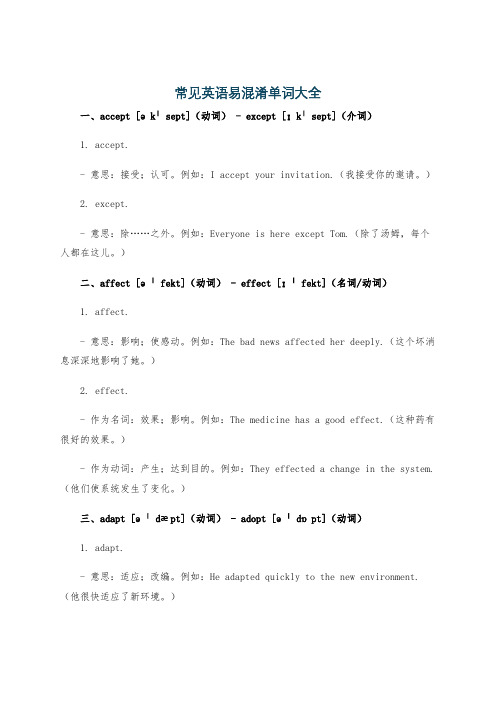
常见英语易混淆单词大全一、accept [əkˈsept](动词) - except [ɪkˈsept](介词)1. accept.- 意思:接受;认可。
例如:I accept your invitation.(我接受你的邀请。
)2. except.- 意思:除……之外。
例如:Everyone is here except Tom.(除了汤姆,每个人都在这儿。
)二、affect [əˈfekt](动词) - effect [ɪˈfekt](名词/动词)1. affect.- 意思:影响;使感动。
例如:The bad news affected her deeply.(这个坏消息深深地影响了她。
)2. effect.- 作为名词:效果;影响。
例如:The medicine has a good effect.(这种药有很好的效果。
)- 作为动词:产生;达到目的。
例如:They effected a change in the system.(他们使系统发生了变化。
)三、adapt [əˈdæpt](动词) - adopt [əˈdɒpt](动词)1. adapt.- 意思:适应;改编。
例如:He adapted quickly to the new environment.(他很快适应了新环境。
)- 例如:They adapted the novel for the film.(他们把这部小说改编成电影。
)2. adopt.- 意思:采用;收养。
例如:We should adopt a new method.(我们应该采用一种新方法。
)- 例如:They decided to adopt an orphan.(他们决定收养一个孤儿。
)四、alive [əˈlaɪv](形容词) - live [lɪv](动词) / [laɪv](形容词)1. alive.- 意思:活着的;有活力的。
只能作表语,不能作定语。
中考英语之易混淆词汇知识点辨析
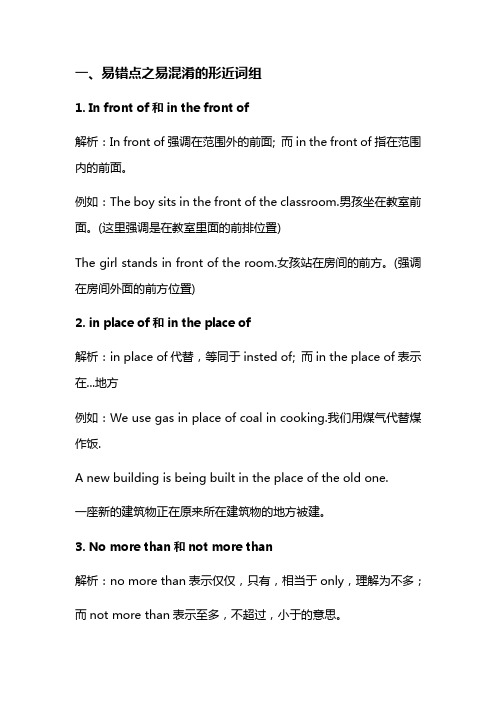
一、易错点之易混淆的形近词组1.In front of和in the front of解析:In front of强调在范围外的前面; 而in the front of指在范围内的前面。
例如:The boy sits in the front of the classroom.男孩坐在教室前面。
(这里强调是在教室里面的前排位置)The girl stands in front of the room.女孩站在房间的前方。
(强调在房间外面的前方位置)2.in place of和in the place of解析:in place of代替,等同于insted of; 而in the place of表示在...地方例如:We use gas in place of coal in cooking.我们用煤气代替煤作饭.A new building is being built in the place of the old one.一座新的建筑物正在原来所在建筑物的地方被建。
3.No more than和not more than解析:no more than表示仅仅,只有,相当于only,理解为不多;而not more than表示至多,不超过,小于的意思。
例如:He is no more than an ordinary English teacher. 他只不过是个普通的英文老师。
He has not more than three children. 他最多3 个孩子(有或许还不到三个)4.On earth和on the earth解析:两者都有在地上,在地球上的意思,但on earth还有到底,究竟的意思;On the earth只是单纯的表示在地上,在地球上例如:where on earth did you spring from?你究竟从哪里冒出来的?What if there was no lead on the earth at all?如果地球上根本就没有铅这种物质怎么办?5.At all和after all解析:at all表示根本,全然的意思,常用短语not at all表示一点也不;after all表示到底,毕竟的意思例如:I don't know him at all. 我根本不认识他。
中考易混淆单词词组汇总
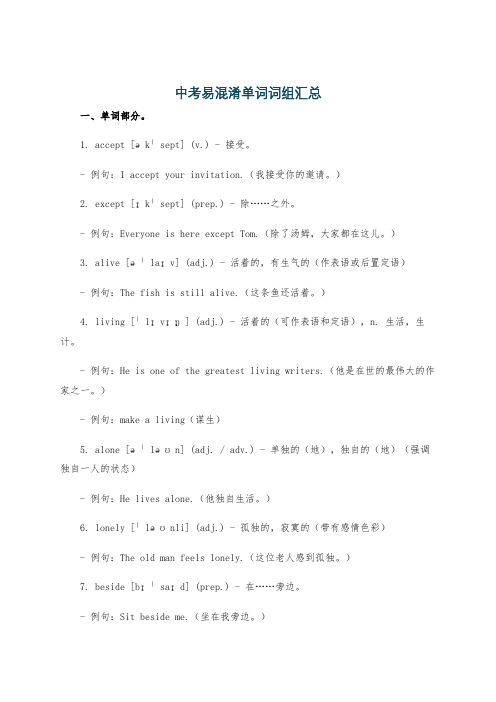
中考易混淆单词词组汇总一、单词部分。
1. accept [əkˈsept] (v.) - 接受。
- 例句:I accept your invitation.(我接受你的邀请。
)2. except [ɪkˈsept] (prep.) - 除……之外。
- 例句:Everyone is here except Tom.(除了汤姆,大家都在这儿。
)3. alive [əˈlaɪv] (adj.) - 活着的,有生气的(作表语或后置定语)- 例句:The fish is still alive.(这条鱼还活着。
)4. living [ˈlɪvɪŋ] (adj.) - 活着的(可作表语和定语),n. 生活,生计。
- 例句:He is one of the greatest living writers.(他是在世的最伟大的作家之一。
)- 例句:make a living(谋生)5. alone [əˈləʊn] (adj. / adv.) - 单独的(地),独自的(地)(强调独自一人的状态)- 例句:He lives alone.(他独自生活。
)6. lonely [ˈləʊnli] (adj.) - 孤独的,寂寞的(带有感情色彩)- 例句:The old man feels lonely.(这位老人感到孤独。
)7. beside [bɪˈsaɪd] (prep.) - 在……旁边。
- 例句:Sit beside me.(坐在我旁边。
)8. besides [bɪˈsaɪdz] (prep. / adv.) - 除……之外(还有),此外。
- 例句:Besides English, we also learn French.(除了英语,我们还学法语。
)- 例句:I don't like this dress. Besides, it's too expensive.(我不喜欢这条裙子。
它太贵了。
初中英语总复习易混词盘点

初中英语总复习易混词盘点初中英语总复习易混词盘点从近年来的中考题可以看出命题者的目的都是要考查学生对一些较易混淆、形式上非常相近的词(词组)是否能掌握扎实,是否熟悉每个词组的中文意思并能在句子中熟练运用。
要想做对以上出现的类似的中考考题,考生必须能总结清各种初中阶段所学过的较易混淆、形式上非常相近的词(词组),熟记所有词组的中文意思,熟悉它们的用法和区别。
为了方便同学们复习,特将常考易混词(词组)整理如下:一、容易混淆的动词:[考试说明] 了解及物动词和不及物动词用法;掌握动词不定式作宾语、宾语补足语、状语以及疑问词连用构成不定式短语的基本用法;理解动词不定式作主语和定语的用法;初步掌握延续性动词和瞬间动词在用法上的区别等。
1. come & be here[误] He has come here for three hours.[正] He came here three hours ago.[正] He has been here for three hours.come是瞬间动词,不是延续性动词,在肯定句中不能与表示一段时间的状语连用。
而要与表示一段时间的状语连用,就要用延续动词。
与此同类的还有borrow/lend-keep; join-be in/at; die-be dead; buy-have; leave-be away,etc.2. cost & take & spend & pay[误] I cost a lot of time to read stories.[正] It cost me a lot of time to read stories.[正] I spent a lot of time reading stories.cost除了钱的花费以外,还能表示时间上的花费,但常用物做主语。
spend句子主语是人,可指花费时间和金钱,但后面的动词要用-ing形式,后面也可跟名词短语,介词用on。
超实用初高衔接英语50个易混淆词汇精讲
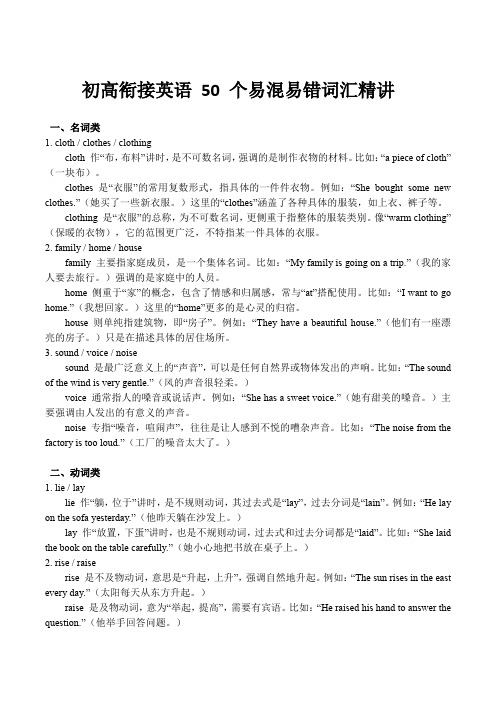
初高衔接英语50 个易混易错词汇精讲一、名词类1. cloth / clothes / clothingcloth 作“布,布料”讲时,是不可数名词,强调的是制作衣物的材料。
比如:“a piece of cloth”(一块布)。
clothes 是“衣服”的常用复数形式,指具体的一件件衣物。
例如:“She bought some new clothes.”(她买了一些新衣服。
)这里的“clothes”涵盖了各种具体的服装,如上衣、裤子等。
clothing 是“衣服”的总称,为不可数名词,更侧重于指整体的服装类别。
像“warm clothing”(保暖的衣物),它的范围更广泛,不特指某一件具体的衣服。
2. family / home / housefamily 主要指家庭成员,是一个集体名词。
比如:“My family is going on a trip.”(我的家人要去旅行。
)强调的是家庭中的人员。
home 侧重于“家”的概念,包含了情感和归属感,常与“at”搭配使用。
比如:“I want to go home.”(我想回家。
)这里的“home”更多的是心灵的归宿。
house 则单纯指建筑物,即“房子”。
例如:“They have a beautiful house.”(他们有一座漂亮的房子。
)只是在描述具体的居住场所。
3. sound / voice / noisesound 是最广泛意义上的“声音”,可以是任何自然界或物体发出的声响。
比如:“The sound of the wind is very gentle.”(风的声音很轻柔。
)voice 通常指人的嗓音或说话声。
例如:“She has a sweet voice.”(她有甜美的嗓音。
)主要强调由人发出的有意义的声音。
noise 专指“噪音,喧闹声”,往往是让人感到不悦的嘈杂声音。
比如:“The noise from the factory is too loud.”(工厂的噪音太大了。
八年级上册英语易错单词
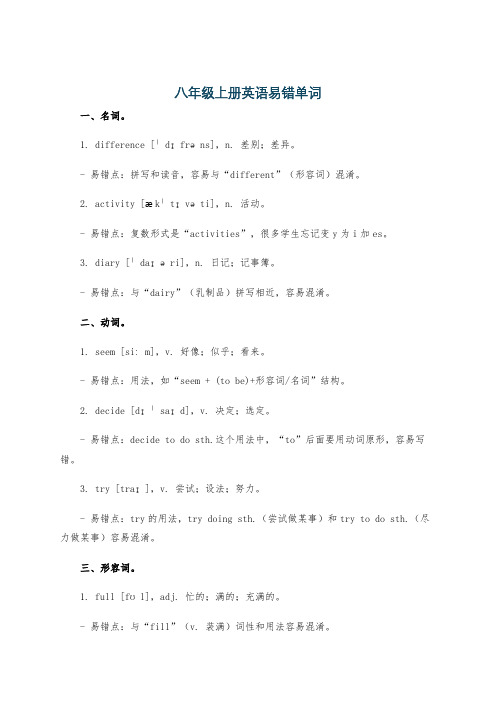
八年级上册英语易错单词一、名词。
1. difference [ˈdɪfrəns],n. 差别;差异。
- 易错点:拼写和读音,容易与“different”(形容词)混淆。
2. activity [ækˈtɪvəti],n. 活动。
- 易错点:复数形式是“activities”,很多学生忘记变y为i加es。
3. diary [ˈdaɪəri],n. 日记;记事簿。
- 易错点:与“dairy”(乳制品)拼写相近,容易混淆。
二、动词。
1. seem [siːm],v. 好像;似乎;看来。
- 易错点:用法,如“seem + (to be)+形容词/名词”结构。
2. decide [dɪˈsaɪd],v. 决定;选定。
- 易错点:decide to do sth.这个用法中,“to”后面要用动词原形,容易写错。
3. try [traɪ],v. 尝试;设法;努力。
- 易错点:try的用法,try doing sth.(尝试做某事)和try to do sth.(尽力做某事)容易混淆。
三、形容词。
1. full [fʊl],adj. 忙的;满的;充满的。
- 易错点:与“fill”(v. 装满)词性和用法容易混淆。
2. wonderful [ˈwʌndəfl],adj. 精彩的;绝妙的。
- 易错点:单词较长,拼写容易出错。
3. enough [ɪˈnʌf],adj. 足够的;充分的。
- 易错点:可放在名词前后,如“enough money”或“money enough”(当修饰形容词或副词时,放在后面,如“good enough”),用法容易出错。
- 1、下载文档前请自行甄别文档内容的完整性,平台不提供额外的编辑、内容补充、找答案等附加服务。
- 2、"仅部分预览"的文档,不可在线预览部分如存在完整性等问题,可反馈申请退款(可完整预览的文档不适用该条件!)。
- 3、如文档侵犯您的权益,请联系客服反馈,我们会尽快为您处理(人工客服工作时间:9:00-18:30)。
1.sound, voice, noisesound自然界各种各样的声音,voice人的嗓音,noise噪音I hate the loud noise outside.2. exercise, exercises, practiceexercise运动,锻炼(不可数),exercises练习(可数),practice(反复做的)练习take exercise 做运动3. work, job二者均指工作。
work不可数,job可数a good job,What interesting work it is!4. cook, cookercook厨师,cooker厨具He is a good cook.5. police, policemanpolice警察的总称,后接复数谓语动词,policeman 指某个具体的警察The police are questioning everyone in the house.6. problem, questionproblem常和困难联系,前面的动词常为think about, solve, raise,question常和疑问联系,多和ask, answer连用7. price, prizeprice价格,prize奖,奖品,奖金win the first prize The price is high/low.8. a number of, the number ofa number of许多,谓语动词用复数。
the number of…的数目,谓语动词用单数。
The number of students is increasing.9. in front of, in the front ofin front of范围外的前面,in the front of范围内的前面A boy sits in the front of the room.10. next year, the next yearnext year将来时间状语,the next year过去将来时间状语He said he would go abroad the next year.11. in bed, on the bedin bed卧在床上,on the bed在床上The book is on the bed. He is ill in bed.12. the people, a peoplethe people指人,a people指民族The Chinese is a peace-loving people.13. it, oneit同一物体,one同类不同一I lost my pen. I have to buy a new one.14. that, thisthat指代上文所提到的,this导出下文所要说的I was ill. That's why…15. none, nothing, no onenone强调有多少,nothing, no one强调有没有,nothing指物,no one指人--- How many…/How much…? --- None.16. anyone, any oneanyone指人,不能接of,any one指人/物均可,可接of, any one of you17. who, whatwho指姓名或关系,what指职业或地位What is your dad? He is a teacher.18. what, whichwhat的选择基础是无限制的,which在一定范围内进行选择Which do you prefer, bananas or apples?19. other, anotherother后接名词复数,another后接名词单数other students, another student20. many, much, a lot ofmany和可数名词连用,much和不可数名词连用,a lot of可数,不可数均可,但不用于否定句I haven't many books.21. much more…than, many more…thanmuch more…than后接形容词或不可数名词,many more…than后接可数名词many more people, much more water, much more beautiful22. no, notno=not a/any, no friend=not a/any friend, no water=not any water23. by oneself, for oneself, to oneselfby oneself单独的,独自的,for oneself为自己,to oneself供自己用的24. at all, after allat all根本,全然, after all到底,毕竟After all he is a child.25. tall, hightall常指人或动物,high常指物体He is tall.26. fast, quicklyfast侧重于指人或物体具有运动速度快的特点,quickly侧重指某事完成或发生的快run fast, answer the question quickly27. high, highlyhigh具体的高,highly抽象的高,高度的think highly of(高度赞扬)28. sleeping, asleep, sleepysleeping正在睡觉,asleep睡着,熟睡,只能做表语,sleepy困的,有睡意的a sleeping baby,The baby is asleep. I'm sleepy.29. real, truereal真的,真实的,指的是事实上存在而不是想象的,true真的,真正的,指的是事实和实际情况相符合real gold, a true story30. pleasant, pleased, pleasingpleasant常用作定语,pleased常用作表语,pleased主语常为人,a pleasant trip,be pleased with…对…感到满意/开心31. ill, sickill做表语,sick定语、表语均可a sick boy, He is sick/ill.32. good, wellgood形容词,well副词,但指身体状况是形容词He is well again.33. hard, hardlyhard努力,hardly几乎不work hard, I can hardly believe it.34. excited, excitingexcited使人兴奋的,exciting令人兴奋的I'm excited. The news is exciting.35. before long, long beforebefore long不久以后,long before很久以前36. happy, gladhappy高兴,幸福,定表均可,glad高兴,只能做表语a happy girl, I’m happy/ glad to see you.37. instead, instead ofinstead是副词,放在句首或句末,instead of是介词短语,放在句中He didn't see a film. Instead he watched TV. He watched TV instead of seeing a film.38. too much, much tootoo much 后接不可数名词,much too后接形容词much too heavy39. raise, riseraise及物动词,rise不及物动词The sun rises in the east. Raise your hand, please.40. bring, take, carry, fetchbring拿来,take带走,carry随身携带,fetch去回这一往返动作fetch a box of chalk41. spend, take, pay, costspend人做主语,花钱,花时间; s pend…on sth./(in) doing sth; take物做主语,花时间; It takes sb some time to do sth.; pay人做主语,花钱,pay for; cost物做主语,花钱;sth cost some money42. join, join in, take part injoin加入某个组织,并成为其中的一员;join in参加小型的活动, join sb. in;take part in 参加大型的活动He joined the army five years ago.43. learn, studylearn学习,侧重学习的结果,study学习,侧重学习的过程,研究study the problem44. want, hope, wishwant打算,想要,want to do, want sb. to do, hope希望(通常可以实现),hope to do/ hope that… wish希望(通常不能实现)wish (sb.) to do, wish sb/sth. + n. I wish you success.45. answer, replyanswer及物动词,reply不及物动词,后接to, reply to the letter46. leave, leave forleave离开,leave for前往He left Beijing for Shanghai.47. drop, falldrop及物\不及物均可,fall不及物动词Prices fell/dropped. He dropped his voice.48. win, lose, beatwin后接sth.,反义词为lose, beat后接sb. win the game, beat them49. live on, live bylive on以…为主食,live by靠…谋生live on fish/ live by fishing50. catch a cold, have a coldcatch a cold不能和表示"一段时间"的状语连用,而have a cold可以She has had a cold for a week.51. change for, change intochange for调换成,change into变成Change the shirt for a bigger one. Water changes into ice.52. go for a doctor, go to a doctorgo for a doctor去请医生,go to a doctor去看病53. arrive, get, reacharrive不及物动词,后接in (大地点),at(小地点),get不及物动词后接to,reach及物动词arrive in Beijing, get to Beijing, reach Beijing54. agree with, agree to,agree with同意某人,agree to同意某事,agree with you, agree to the plan, agree to do sth55. receive, acceptreceive收到某一东西,但不一定接受,accept接受I received a gift, but I didn't accept it.56. wear, put on, dresswear和dress表状态,wear接衣服等,可用进行时,dress接人,be dressed in, put on表动作It's cold outside. Put on your warm clothes.57. listen, hearlisten强调动作,hear强调结果I listened, but I heard nothing.58. look, see, watchlook看的动作,see看的结果,watch强调所看物体的变化、移动和发展watch TV59. lie, laylie躺,位于(lay, lain),说谎(lied, lied),lay平放(laid, laid) lay the book60. turn, get, growturn表突变,后常接表颜色的词,get强调变的结果,grow强调过程,逐渐的变化turn yellow, get tired, grow big61. close, shut, turn offclose和shut当关解时可以通用,用于可开合的物体,turn off用于指有开关的物体Close/Shut the door. Turn off the TV.62. at, in (表地点)at小地点,in大地点arrive at a small village, arrive in Shanghai63. day after day, day by dayday after day日复一日(无变化);day by day一天天地(有变化)Trees grow taller day by day.64. after, in (表时间)after接时间点,in接时间段,用于将来时after 7:00, in five minutes65. between, amongbetween两者之间,三者或三者以上两两之间, among三者或三者以上之间Switzerland lies between France, Germany, Australia and Italy.66. through, acrossthrough穿越空间,across在…上穿过through the forest, across the desert67. above, on, overabove在上面,不接触,on在上面,接触,over在正上方fly over the hill68. until, not…untiluntil到…为止,not…until直到…才(常跟点动词连用)I waited until 3:00.He didn't come until 3:00.69. besides, exceptbesides除了…还(包括在内)except除了(不包括在内),70. because, because ofbecause连词,连接两句话,because of后接词或短语He didn't go to school because of his illness.71. for example, such asfor example一般只列举一个,such as列举多个例子I have been to a lot of American cities, such as New York, Atlanta and Chicago.72. All right. That's all right. That's right.All right好吧;That's all right.没关系;That's right. 那是对的---Sorry. --- That's all right.73. such…that, so…that当如此…以至于解时,such…that修饰名词,so…that修饰形容词或副词,但名词前面如果有many, much, little, few修饰用so…that,不用such thatso many people that… such a lovely boy=so lovely a boy74. Shall I…? Will you…?Shall I…? 征求对方意见或向对方请示,意为我能…吗? Will you…?请求或建议对方做某事,意为你愿意…吗? Will you help me? Yes, I will.。
